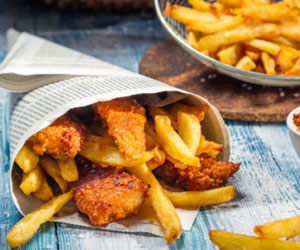Food sellers and customers have been encouraged by the Food Safety and Standards Authority of India (FSSAI) to “immediately stop using newspapers for packing, serving, and storing food items”.
FSSAI voiced worry about foodborne illnesses linked to paper ink in a directive that was released.
The CEO of FSSAI, G Kamala Vardhana Rao, stated that “the ink used in newspapers contains various bioactive materials with known adverse health effects, which can contaminate food and lead to health issues when ingested”.
According to the guideline, printing inks may include heavy metals including lead that can seep into food and cause major health hazards over time. The FSSAI further noted that because of the “various environmental conditions during distribution, making them susceptible to contamination by bacteria, viruses, or other pathogens that may transfer to the food, potentially causing food-borne illnesses,” newspapers are frequently exposed to pathogens that could contaminate them.
Clinical nutritionist Garima Goyal noted that it can result in food poisoning and digestive problems. “Harmful substances, including dyes, alcohol, pigments, binders, preservatives, and additives, are present in printing ink. These chemicals mildly upset the stomach when ingested in tiny amounts. However, an overdose might result in stomach sickness and health issues associated to cancer. Due to the weakness of their immune systems, youngsters and the elderly are more vulnerable, she added.
Dr. Srikanth K P, consultant in paediatric gastroenterology and hepatology at Manipal Hospital, Old Airport Road, Whitefield and Sarjapur, Bangalore, remarked that the ink on these papers may disintegrate into the food.
“Chronic exposure may not result in an immediate issue, but over time, it may lead to major health problems that put lives in danger. Some people wrap food with plastic that is placed on top of newspaper. But once more, hot food can melt the plastic, which is unquestionably unsafe, according to Dr. Srikanth.
Food wrapped in newspaper may absorb the odor of the paper as well as the heavy metals from the ink, changing both the flavor and smell of the food.
“Sensitive people might find such meals unpleasant. Additionally, it can smear and detract from the aesthetic appeal of your encounter, which will lessen how much you enjoy your meal. The total experience, a crucial component of satisfying a meal, is diminished by this, according to Goyal.




























